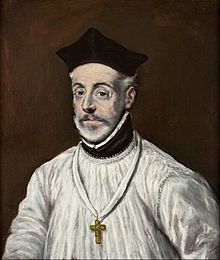Diego de Covarruvias y Leyva
|
Most Reverend Francisco Andrés de Carvajal |
|
|---|---|
| Archbishop (Personal Title) of Cuenca | |

Diego de Covarrubias, by El Greco
|
|
| Church | Catholic Church |
| Diocese | Diocese of Cuenca |
| Predecessor | Gaspar de Quiroga y Vela |
| Successor | Rodrigo de Castro Osorio |
| Orders | |
| Consecration | April 28, 1560 by Fernando de Valdés y Salas |
| Personal details | |
| Born | July 25, 1512 Toledo, Spain |
| Died | September 27, 1577 (age 65) Madrid |
| Nationality | Spanish |
| Previous post |
Archbishop of Santo Domingo (1556-1560) Archbishop (Personal Title) of Ciudad Rodrigo (1560-1564) Archbishop (Personal Title) of Segovia (1564-1577) |
Diego de Covarrubias y Leyva or Covarruvias (July 25, 1512 – September 27, 1577) was a Spanish jurist and Roman Catholic prelate who served as Archbishop (Personal Title) of Cuenca (1577-1577), Archbishop (Personal Title) of Segovia (1564-1577), Archbishop (Personal Title) of Ciudad Rodrigo (1560-1564), and Archbishop of Santo Domingo (1556-1560).
Covarruvias was born in Toledo, Spain, on 25 July 1512. His father was Alonso de Covarrubias (1488-1570), an architect who designed the New Kings chapel of the Cathedral of Toledo. Diego's younger brother, Antonio de Covarrubias (1514/24-1602), would be a professor of law at the University of Salamanca and served as consejero of Castile.
Diego de Covarrubias was educated at the University of Salamanca, where he studied canon law under Martín de Azpilcueta and theology under Francisco de Vitoria and Domingo de Soto. At the age of twenty-one, Covarruvias was appointed professor of canon law in the University of Salamanca. Later on he was entrusted with the work of reforming that institution, already venerable for its age, and the legislation which he drew up looking to this end remained in effect long after his time.
Such was the recognized eminence of his legal science that he was styled the Bartolus of Spain. His vast legal learning was always set forth with a peculiar beauty of diction and lucidity of style. His genius was universal, and embraced all the sciences subsidiary to, and illustrative of, the science of law. If report be true, the large library of Oviedo, where at the age of twenty-six he became professor, did not contain a single volume which he had not annotated.
...
Wikipedia
